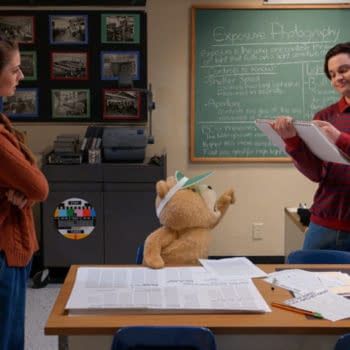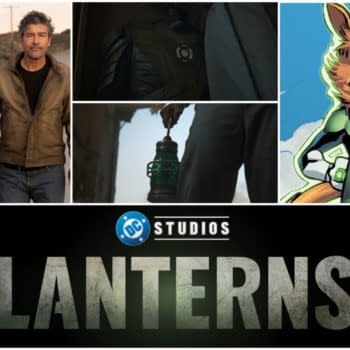Posted in: Movies, Recent Updates, Video Games | Tagged: Adam Koebel, Dungeon World, entertainment, kickstarter, rpg, Sage LaTorra, table top gaming
'Adventure And Craziness' – Talking Shop With Dungeon World Designers Sage LaTorra and Adam Koebel
By Christopher Helton
For those who may not know, Dungeon World is a tabletop role-playing game that blew up (in a good way) on Kickstarter, making over twenty times its funding goal. It is also available in French and Italian translations. Based on the popular Apocalypse World game, a post-apocalyptic roleplaying game created by Vincent Baker. While a review of the game is going to follow, I spoke with Sage Kobold Production owners/designers Sage LaTorra and Adam Koebel about the game, its background and what is coming up for the designers.
Christopher Helton: Thank you guys for talking with me today. First, let's unpack things a bit for those who may not know. What is Dungeon World?
![SageLaTorra[cropped]](https://mlpnk72yciwc.i.optimole.com/cqhiHLc.IIZS~2ef73/w:338/h:350/q:75/https://bleedingcool.com/wp-content/uploads/2014/03/SageLaTorracropped.jpg)
If you're new to tabletop gaming that's all you need to know. If you're familiar with other games, you might be asking how Dungeon World is different. Well, Dungeon World is designed to be fast moving and really make use of you and the other players at the table. We're of the opinion that the people playing are the greatest element of roleplaying games and we want to make rules that work with them. We also try to give the person running the game clear, direct, actionable ways to run the game and keep the action moving.
Adam Koebel: Dungeon World was designed to be the D&D that people remember from when they first started playing. It's a call-back to that sense of adventure and craziness, the thrill of "we can do anything" that first-time roleplayers get. We wanted to make a game where the core rules are "describe things" and "get stoked about the characters".
CH: Before we get too in-depth, let's talk a little bit about Apocalypse World, the game that Dungeon World is based upon. What was it about Apocalypse World that appealed to you as gamers that lead to the interest to design Dungeon World around it?
AK: Apocalypse World really spoke to me as soon as I read Vincent Baker's original play test material. I think my favourite thing is how he took all this stuff that other games call "GM advice" or "GM suggestions" and in Apocalypse World they're the rules of the game. It's not about "here's some ways you could play this" it's clear, obvious procedures for making the game work. Rules are, in my mind, the best way to make sure that players of a game are having the experience that the designer intended and I love that about AW.
SL: I had much the same experience, though for me it's less about what the designer intended and more about just being clear and up-front about the things we did when we played the game that we enjoyed. It bothers me a little when someone writes a game and doesn't just flat out tell me how they played it, because I assume they had fun playing it and I want to try that. "GM advice" that says "you could do it this way, or this way, or this way" is more like designer advice: here are all the ways you could do this. As a GM you're part designer, so that makes sense, but I also really want to know how the game worked for you. AW was really clear about that, and it reminded me of some of my favorite fantasy game sessions, so we ran with it.
CH: That brings up my next question…why a fantasy game? I know that there are some people who think that there are enough fantasy role-playing games out there, thankfully I'm not one of them. What is the draw for each of you to fantasy as a genre, and fantasy gaming as well, that lead to the development of Dungeon World?
SL: I think the wonderful thing about any genre is that we're always reinterpreting it in the current moment. Just like there's always room for more fantasy novels, there's always room for more fantasy games. Every contribution to the genre, every comic, novel, movie, and game, opens up opportunities for more.
As for why fantasy in particular, we're both huge fans. We didn't start out trying to make a game and then find this fantasy adventure genre, we started out loving this genre and saw something we wanted to contribute to it.
I think nailing down why I love the genre so much is hard. There are a lot of reasons, but I don't know that any one covers all of it. For one thing, I enjoy fantastic magic over even soft sci-fi, because the way the feels right matters more than justifying how it works. You can just say "because of an ancient pact between demon gods" and that's enough. I also enjoy fantasy as a melting pot. It's easy to take elements of other genres and plug them into fantasy (the same goes for superheroes, I think). Fantasy is a great place to take everything stewing around in pop culture and melt it together.
AK: Fantasy adventure is where this hobby cut its teeth. No matter what happens to Dungeons & Dragons as a brand or a product, people will always associate funny-shaped dice and character sheets with elves, dwarves and wizards. It's the pedigree that roleplaying has built into it, culturally. There are a lot of amazing games being made that have literally nothing to do with any of that, obviously (check out just about anything by Jason Morningstar, for example), but for us, it just felt right to make our first design about something we felt would resonate with people.
Fantasy is extremely broad, too – it's a palette with a lot of different colours on it and Dungeon World was designed to let people play with the colours they like best. You can see it in the inherent setting of the game – it's tied very strongly to the original tropes of the genre and you can paint a pretty great picture with those basic tropes, but I'd like to think we've provided the right tools for players so that if you want your fantasy setting to be Cyan and Magenta instead of Red and Blue, you're able to do that.
CH: You get charged with "ruining role-playing" a lot, particularly online. There seems to be a lot of people who also spend a lot of time saying that Dungeon World "isn't a role-playing game." How do you handle when this happens? Do you find that people doing this helps, or hinders, your game in the longer run of things?

SL: The opposite of love isn't hate, it's indifference. The fact that people react to Dungeon World at all says to me that we hit something. We're also in a great place where Dungeon World has already succeeded wildly, so negative feedback is no skin off our backs. Since our goals were more about sharing our love of the genre and our ideas we get to talk to these people frankly instead of always trying to sell them on the game. It's actually a lot of fun. Even the people we don't get to have a real conversation with we get to see some wonderfully hyperbolic invective, which is fun in its own right.
CH: You launched Dungeon World via Kickstarter. Looking back , would you have done this differently? Do you think that the successful Kickstarter campaign helped or hindered the launch of your game?
SL: Kickstarter itself was really useful. I launched our campaign on a weekday morning before I drove to work. In the 15 minutes it took me to get to work we met our funding goal. That was critical in letting us know how to develop the game, how to distribute it. If we had bankrolled the game ourselves we would have printed too few, at too low a quality. Our backers were instrumental in helping us get it right.
But there were some things I'd do differently. We shipped every single package out of my basement, which was absolutely insane. We did a few too many cute little add-ons, pins and pens and such. They're all cool, and there's nothing like seeing someone at a con wearing a shirt for your game, but they're also a lot of overhead. I really like making games, sometimes also dealing with apparel on top of that can get in the way.
AK: Kickstarter is a part of a much larger engine (i.e., the internet) that's really making self-publishing a possibility for us and for every other game designer. I remember asking a panelist at PAX back in 2005 about whether it was possible for a game designer to stand alone and be successful releasing their own stuff. They told me it was a pipe dream. I'm not going to name names, but that designer was so wrong. Kickstarter is a really interesting tool, but I feel like people still don't fully understand it. It's been fantastic watching how different projects are built and funded.
CH: Some game store retailers feel that a game launched via Kickstarter won't sell in retail channels, because the campaign has already sold copies to the target market. Have you found this to be the case with Dungeon World?
AK: This is a ludicrous opinion to have. While we're not as deeply injected into the retail market, all anyone has to do in this post-Kickstarter age is point at Fred Hicks and his team (shoutouts to Chris Hanrahan) at Evil Hat and the massive and frankly awe-inspiring success they've had with Fate Core. From an "RPG as saleable artifact" angle, Fate changed the game.
SL: Our constant challenges in keeping the game in stock say the same thing. We're on our third printing, every one as big as our Kickstarter run.
CH: As a first time small press publisher with Dungeon World, what were some of the pitfalls and obstacles that you ran into getting your game into distribution and into stores? What advice would you offer to those who are thinking of launching their first game?
SL: Distribution is interesting. It helps to have someone to introduce you, not because it's a super exclusive club, but just because it's hard to know who to even contact. And once you're set up it's a pretty confusing system. We're still trying to get a handle on how to do print runs before we actually run out of books. Dealing with demand, communication, and all that is as much of a job as designing a game.
For anyone considering distribution: don't think about that yet. If it's not already blindingly obvious that you need to deal with all these headaches, don't. Focus on making a game and seeing how people react. When fans are beating down your door for wider distribution (which won't happen for every game) then maybe deal with all this. Until then, count your lucky stars that you cannot worry about it.
AK: We're still learning a lot about how that side of the business works. It's especially tricky because there are so many distribution channels and dealing with getting copies of the book to stores can be remarkably tricky. It's harder to distribute games to Canada, for example, than I ever would have imagined.
CH: If you could go back to when you were starting to develop Dungeon World and give yourself advice about the whole process, knowing what you know now, what would you say to yourself?
AK: You know, I love this kind of question because my answer is always such a flip one. I wouldn't tell myself to do anything differently. I'd just say "have fun, buddy" and watch things go the way they went. The thing is, if I'd been doing this alone, it'd be a different story but working with Sage has meant we can really play ping-pong with responsibility. Having a reliable partner is something I can't understate the value of. He's the Woz to my Jobs. The Arneson to my Gygax. Or maybe it's vice versa.
SL: I was all ready to reply with "oh way, no, I'm Jobs/Gygax" but you actually nailed it. It's funny, developing something in such an equal partnership now I look at other duos, anything from Page and Brin to the Mythbusters, and think "I get that." I also can't help trying to figure out which one of us is which (I'm Page and Hyneman, I think).
Oh yeah, the actual question: a lot like Adam, I'd just tell myself to have fun. There are things that we've learned from, but I wouldn't want to keep my younger self from those learning experiences.
CH: What are some of the games around that are catching your attention and grabbing your play time right now?
SL: I love it when people ask this, because "tell me about games you're thinking about" is pretty much what I do even when people don't ask.
For RPGs I just played a bunch of Pendragon, which is a fantastic game of Arthurian legend. We had a great time playing within feudal power structures, which was the greatest part of the game for us. We've transitioned to Apocalypse World: Dark Age, [a play test of] Vincent Baker's Apocalypse World-based game inspired in part by Game of Thrones, which has so far hit many of the same things I was digging in Pendragon. It's still really early (we're providing him with play test feedback) but I have great hopes for it.
In Nomine [from Steve Jackson Games] has also been on my mind a lot recently. It's representative of one of those games where I feel like there's an amazing core buried under some stuff that doesn't really matter, some clunky bits, and way too much text. I don't know where that'll head.
Adam and I both play all kinds of games, so there's a lot of non-RPG stuff that's been grabbing my attention. The counter-insurgency boardgames of Volko Ruhnke (Cuba Libre, Andean Abyss, A Distant Plain), solo boardgames (The Hunters, Silent Victory), the latest Magic block, Titanfall, Strider, 60 Second Shooter. For me playing anything and everything is part of making games.
AK: I've been playing Gregor Vuga's Sagas of the Icelanders on the regular for about five weeks and it is so great. It's a prime example of one of those "not about anything fantastical" types of games. The players are just Icelandic settlers trying to get by in the 900s in a world that's hostile to their very existence. It's been really fun, we've had blood feuds and broken hearts and drama all over the place.
I'm also really into Scott Mathis' Transylvanian Adventures, which is a hack of the amazing Dungeon Crawl Classics by Goodman Games. Harley Stroh and the Goodman folks have made a ridiculous RPG that really hit the spot for one of my groups and when Transylvanian Adventures dropped, I knew it would be a perfect fit. We're closing up the campaign now – the players have their sights set on Dracula himself.
SL: I can't believe I forgot Sagas! I haven't played it recently, but every time I do it's been amazing. I actually wrote one of the playbooks in that game, that's how much I love it.
CH: What's next on the game design/publishing agenda for you?
AK: Anyone who follows us on Google Plus will probably have heard the whispers-in-the-dark that give away what Sage Kobold Productions is up to these days. We've been working on an existential horror-game called Black Stars Rise and are in a sort of pre-alpha phase, leaking bits and pieces onto the internet.
SL: We're also working on our first Dungeon World supplement, Inglorious, which is all about war. It's been an interesting process of development, because I think Adam and I are both very challenge-based in our design. With Inglorious, once we nailed down the tough bits, I think we let ourselves slack off too much, while tougher problems like Black Stars Rise took our attention.
CH: What's the best way for people interested in Dungeon World to find out more about your game? How can interested retailers put your game into their stores?
SL: For fans, the Dungeon World website is a great starting point. We don't run our own forum since we want people to discuss Dungeon World wherever they prefer, but the Google+ community is the most active dedicated venue that I know of.
For retailers, they should be able to get the game from Indie Press Revolution or Alliance. Unfortunately as I said above we get caught off guard by demand, so sometimes you may have to wait a bit while we print more. Anyone can always reach out to us directly at gm@dungeon-world.com.
AK: For anyone who wants a closer look at Dungeon World before they pick it up, the whole game is available for free because we love you. Creative Commons licensing has been so great for us and a particularly enterprising fan has a version of the rules here.
If you like what you see, or want to pick up a copy of the game, you can fine out more here: http://www.indiepressrevolution.com/xcart/product.php?productid=18774&cat=0&featured=Y or here http://rpg.drivethrustuff.com/product/108028/Dungeon-World
Christopher Helton is a blogger, podcaster and tabletop RPG publisher who talks about games and other forms of geekery at the long-running Dorkland! blog. He is also the co-publisher at the ENnie Award winning Battlefield Press, Inc. You can find him on Twitter at @dorkland and on G+ at https://plus.google.com/+ChristopherHelton/ where he will talk your ear off about gaming and comics.
















